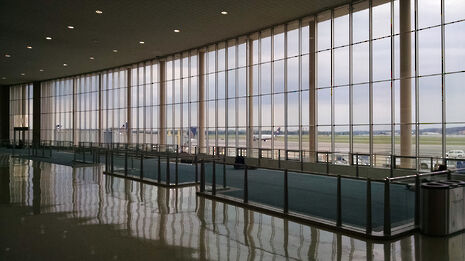Music for the end of the world
Prompted by hearing airport music at Heathrow on her way to America this Christmas, Madeleine Pulman-Jones wonders what the end of the world might sound like

This World is not Conclusion.
A Species stands beyond -
Invisible, as Music -
But positive, as Sound -
It beckons, and it baffles -
Philosophy, dont know –
- Emily Dickinson, ‘This World is not Conclusion (373)’
In an airport, everything happens to you all at once. To walk through departures to your gate is to feel that everything that happened to you where you’re coming from, and everything that will happen to you where you’re going, is happening to you suddenly and all at once.
How many characters in how many films have lingered anxiously on the edge of the airport’s metaphorical diving board before plunging into life? The airport is Ingrid Bergman asking Humphrey Bogart, “but what about us?” at the end of Casablanca – it’s where all those taxis in all those movies are headed after the engine revs, after the fade-to-black, leaving someone behind on the curb.
“Music is most needed when you’re alone in a crowd – it’s like the wax layer on a waterproof jacket, sealing each individual thread and protecting against the elements.”
Fear haunts the airport. Maybe it’s because the image of a plane-crash is so violent, or because we’ve been trained to conjure it with such ease – for whatever reason, the fog of disaster mingles with that familiar fog of tiredness as we trudge through duty free, and lingers long after we reach our gate.
We’re rarely closer to the end of the world than when we’re at an airport. There, the threat of doom and destruction is intensified and unsettlingly near. I was sitting in a cubicle at Heathrow Terminal 5 when this occurred to me. What made me realise it wasn’t increased security or a forecast of stormy weather for take-off – it was Debussy’s Clair de Lune. It was playing in the toilets.
I thought to myself, “when the world ends, someone will probably start playing Debussy.” The thought gave me a warm feeling. As far as background music goes, Clair de Lune has to be among the most played and the most calming. We feel that once glazed in Debussy’s opalescent, rippling tones, or almost any tones for that matter, we are infinitely more protected, more equipped to face disaster. Like the ubiquitous radio in the doctors’ waiting room and the inescapable hum of elevator jazz, airport music is music beating back the bad. Who are these people that choose the music for airport toilets, put radios in doctors’ waiting rooms, and install tiny speakers in elevators? I wonder if they have conferences, and what they talk about at them.

This summer, I got an eye infection on a remote Greek island. The island has one doctors’ practice which is located on the harbour at the bottom of the stone steps on which the town is built. In order to catch the early boat to the beach, I woke early with my mother and walked down, bleary eyed, to the practice. We waited in a small room with the door open in the thirty-five-degree heat. There was no music playing.
There wasn’t even any Europop on the radio spilling out into the street. There was nothing to drown out that niggling sound of worrying or to distract from our awkward interactions. I didn’t notice the lack of music then, but perhaps that’s because I was not alone. Music is most needed when you’re alone in a crowd – it’s like the wax layer on a waterproof jacket, sealing each individual thread and protecting against the elements.
I find it odd that my mother didn’t comment on the lack of music at the doctors’ practice. She has a spatial relationship to music and feels a physical need to put it on whenever she enters a room. One of her musical rituals occurs each Friday evening when she gets home from teaching her final drama class. Usually home before her, my father prepares his record player and, just before she walks in the door, plays the Henry Mancini soundtrack to Breakfast at Tiffany’s. With the hi-fi at full blast, the opening bars of Moon River rush out into the driveway and embrace her tired body. The speakers pulse sound into the air, into which she relaxes, her slackened posture supported by the Mancini vibrations.
“We feel that once glazed in Debussy’s opalescent, rippling tones, or almost any tones for that matter, we are infinitely more protected, more equipped to face disaster.”
We form a crucial part of our perception of space through auditory clues such as pitch. Sound and space are sensually and essentially linked. Whether the music is Henry Mancini, or Debussy – or Taylor Swift – is ultimately not important; in these waiting rooms, these elevators, these homes, we use music to build bunkers in the air, to cushion ourselves from reality just that little bit longer until we are forced, finally, to go out into the unknown.
In his book The Red Cavalry, Russian writer Isaac Babel uses the phrase, “the air, loud as music,” when describing the fevered vision of Sashka, a Polish village boy who fancies himself as a saint. Reading The Red Cavalry, Babel’s vision of the madness of war, it often feels as though he knew not only what the end of the world would look like, but also what it would sound like. It’s profoundly unsettling to think of air as loud as music – music and air, like oil and water, exist one on top of the other, but never mix. If we aren’t using music to build, to make sense of space, maybe we’re pouring it into the air to make it taste different.
People always think of what the end of the world would look like. I want to know what it would sound like. Aside from the compulsory crashing and burning, what music, if any, would we be pouring into that air? What would we be building with it as the world falls down? I’d bet good money that people would be playing music – I’d even bet that they would be playing Debussy.
 News / Christ’s announces toned-down ‘soirée’ in place of May Ball3 February 2026
News / Christ’s announces toned-down ‘soirée’ in place of May Ball3 February 2026 News / Right-wing billionaire Peter Thiel gives ‘antichrist’ lecture in Cambridge6 February 2026
News / Right-wing billionaire Peter Thiel gives ‘antichrist’ lecture in Cambridge6 February 2026 News / John’s duped into £10m overspend6 February 2026
News / John’s duped into £10m overspend6 February 2026 News / Epstein contacted Cambridge academics about research funding6 February 2026
News / Epstein contacted Cambridge academics about research funding6 February 2026 News / Corpus FemSoc no longer named after man6 February 2026
News / Corpus FemSoc no longer named after man6 February 2026










